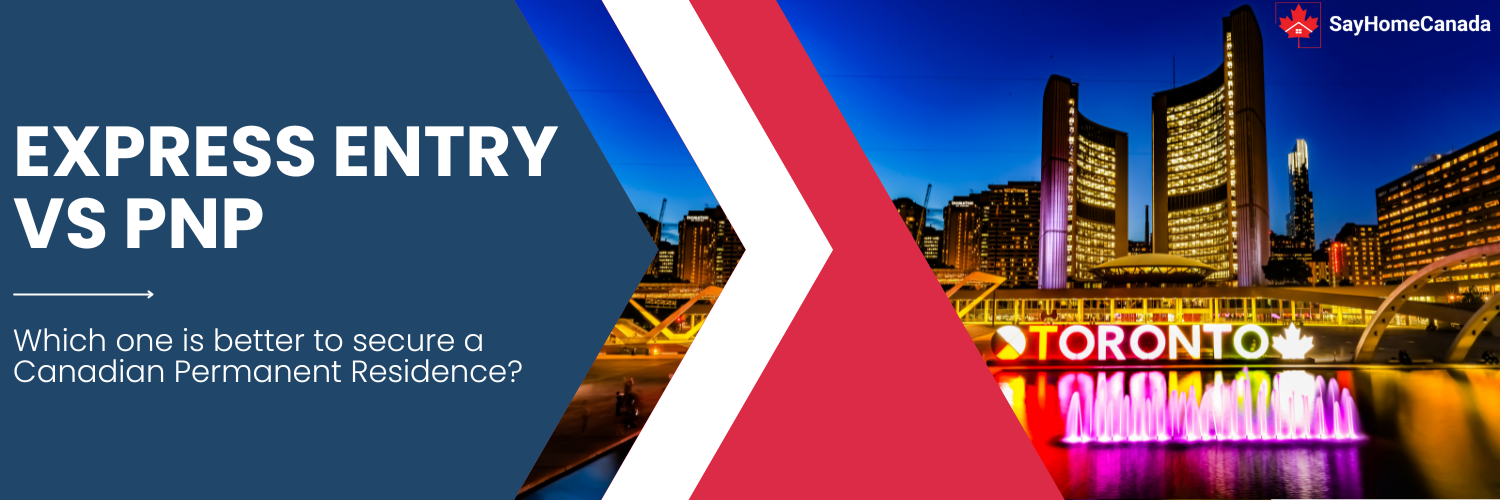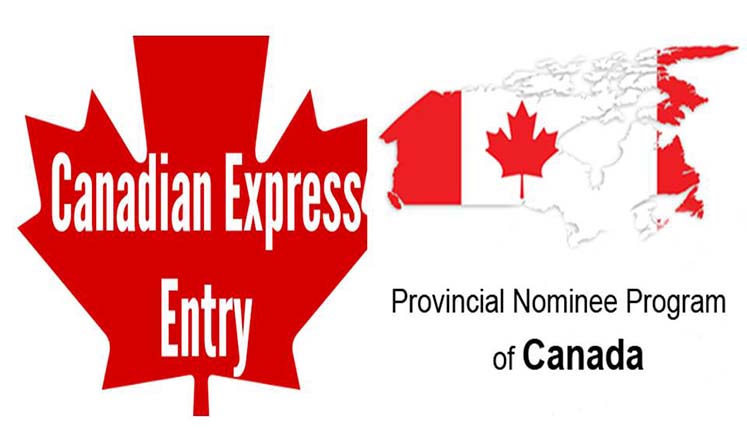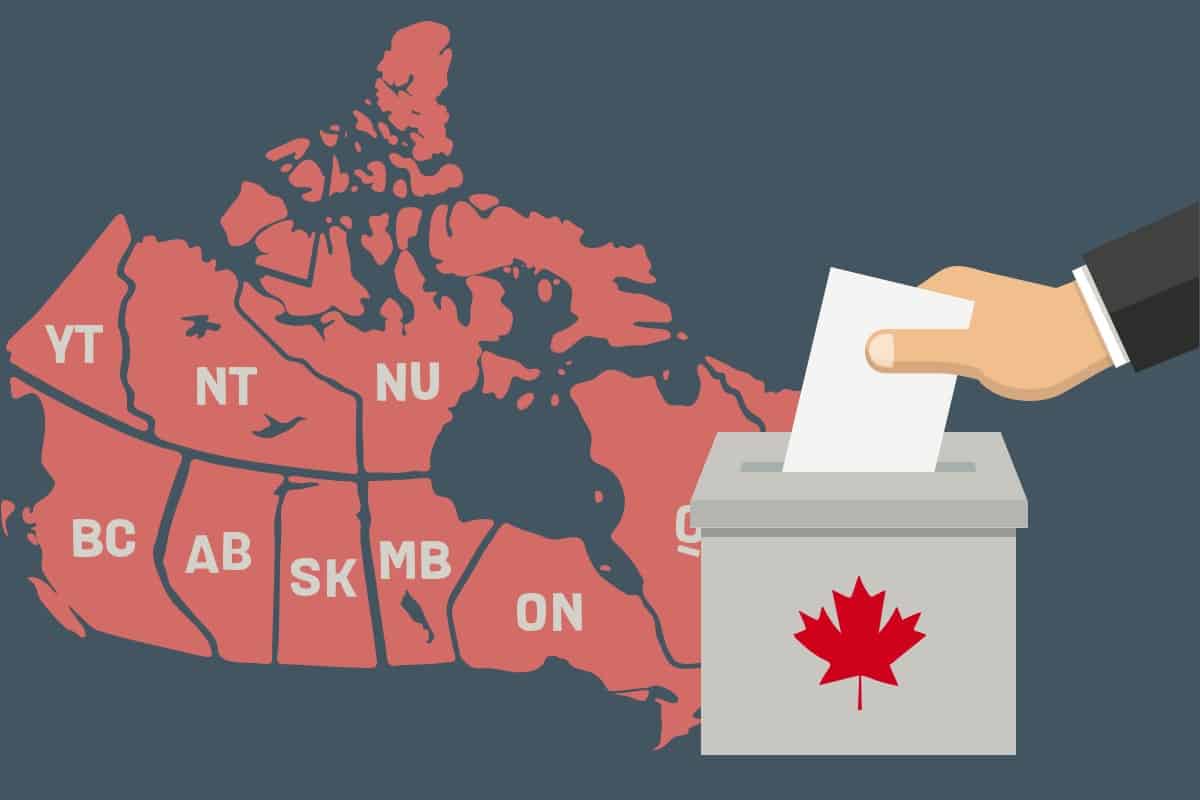
 Express Entry
Express Entry
Canada, renowned for its boundless opportunities and high quality of life, has become a coveted destination for immigrants. For many Nigerians and other international citizens, the aspiration of Canadian Permanent Residence centers around two primary avenues: Express Entry and the Provincial Nominee Program (PNP). But which pathway offers the most potential for your unique situation? Let’s unearth the specifics of each.
Let’s unearth the specifics of each, including the difference between PNP and Express Entry and whether you can apply for Express Entry and PNP at the same time. Additionally, we’ll delve into the easy PR provinces in Canada and the PNP Express Entry processing time to help you make an informed decision for your immigration journey.
The Express Entry system is not just Canada’s primary immigration pathway—it’s an innovative approach to filtering through potential candidates for those who align best with Canada’s economic needs.
Now, let’s explore how Express Entry compares to the Provincial Nominee Program (PNP) and address common queries like “Can I apply for Express Entry and PNP at the same time?” and the “Difference between PNP and Express Entry.” Additionally, we’ll delve into the PNP Express Entry processing time and highlight the easy PR provinces in Canada to provide a comprehensive understanding for your immigration decisions.
Efficiency and Speed:
The Express Entry system is designed for swift processing. Many candidates often receive their Permanent Residency within six months of applying. This efficiency is crucial when considering the PNP Express Entry processing time and choosing between the Provincial Nominee Program (PNP) and Express Entry.

Flexibility in Residence Choice:
Successful candidates aren’t restricted to a specific province or territory. They can choose to settle anywhere in Canada (except Quebec, which has its own system). This flexibility addresses the common question of “Can I apply for Express Entry and PNP at the same time?”
Transparent Point System:
The Comprehensive Ranking System (CRS) offers a transparent way for candidates to understand their eligibility and ranking. It also allows candidates to identify areas where they can improve their score. It also allows candidates to identify areas where they can improve their score, making it essential to comprehend the difference between PNP and Express Entry.
Diverse Applicant Acceptance:
Express Entry encompasses three major economic immigration categories: Federal Skilled Worker Program, Federal Skilled Trades Program, and Canadian Experience Class, allowing a diverse range of professionals to apply. This inclusivity highlights the diversity in options when choosing between PNP vs Express Entry.
Regular Draws:
The Canadian government conducts regular draws, giving consistent opportunities for candidates to receive an Invitation to Apply (ITA) for Permanent Residency. This frequency is essential when considering the easy PR provinces in Canada, providing candidates with multiple chances to secure their pathway to Canadian Permanent Residency.
Intense Competition:
Given its global accessibility, the competition within the Express Entry pool is intense. Only those with the highest CRS scores are typically invited, emphasizing the importance of understanding the PNP Express Entry processing time and evaluating whether the Provincial Nominee Program (PNP) might offer a more favorable alternative.
Fluctuating CRS Scores:
The CRS score required can vary with each draw, making predictability a challenge. Candidates contemplating “Can I apply for Express Entry and PNP at the same time?” must be aware of the dynamic nature of CRS scores and the necessity to adapt strategies accordingly.
No Guarantees:
Even if you meet the minimum criteria, there’s no guarantee of receiving an ITA. It all depends on your CRS score relative to others in the pool. This uncertainty underscores the difference between PNP and Express Entry and the need to explore alternatives.
Limited Validity:
If not invited, a candidate’s profile remains in the pool for only 12 months. If not selected within this timeframe, they must create a new profile. Understanding the easy PR provinces in Canada can be pivotal in deciding the best course of action within this time constraint.

The PNP operates on a more regional spectrum, allowing Canadian provinces to directly tap into the pool of immigrants to meet their specific requirements, showcasing the PNP vs Express Entry as two distinctive immigration pathways;
The Foundation of PNP:
Each participating province or territory has its agreement with the Canadian government, allowing them to select immigrants suited to their local needs. Understanding the PNP Express Entry processing time is crucial for applicants considering a regional approach.
Program Variability:
Skills & Experience Streams: Tailored for skilled professionals in sectors experiencing labor shortages in the province, showcasing the difference between PNP and Express Entry in terms of targeted immigration.
Business Streams: Entrepreneurs, investors, or business owners willing to invest and operate in the province can apply here. Considering “Can I apply for Express Entry and PNP at the same time?” becomes relevant for those exploring diverse pathways.
International Graduate Streams: Recent graduates from provincial institutions might be favored, reflecting the province’s emphasis on retaining international talent and highlighting the appeal of easy PR provinces in Canada for skilled graduates.
Localized Opportunities:
PNPs are designed to address specific labor and demographic needs of the provinces, providing easy PR provinces in Canada that align with localized job demands. This can offer targeted opportunities for applicants.
Alternative Pathway:
Even if your CRS score isn’t competitive in the Express Entry pool, securing a provincial nomination can add a significant 600 points, showcasing the difference between PNP and Express Entry and offering a strategic PNP vs Express Entry alternative.
Diverse Streams:
Many provinces have multiple PNP streams, catering to various professions, skills, and backgrounds. Understanding the PNP Express Entry processing time is crucial for applicants navigating the various streams.
Retention Strategies:
Some provinces, recognizing the value of international students, have streams dedicated to those who’ve studied in the province, aiming for higher retention rates. Exploring if “Can I apply for Express Entry and PNP at the same time?” is possible becomes relevant for those seeking diverse pathways.
Read More: Canada student spouse visa rejected
Geographical Obligation:
If nominated, there’s an expectation that you’ll reside and contribute to that specific province for a certain period, adding a difference between PNP and Express Entry in terms of geographical commitment.
Complexity and Variability:
Every province has its criteria, processes, and requirements, making the PNP a complex system to navigate. What works for one province may not apply to another, highlighting the difference between PNP and Express Entry.
Caps on Nominations:
Each province has a limited number of nominations they can issue each year. This cap can influence your chances, especially in popular provinces, emphasizing the difference between PNP and Express Entry quotas.
Potential for Longer Processing:
While Express Entry boasts speedy processing, PNPs, depending on the province and stream, might take longer to process. Understanding the PNP Express Entry processing time becomes crucial for applicants considering both pathways.
Certainly! Let’s delve deeper into the intricacies of both the Express Entry and PNP programs for those aspiring to gain permanent residency in Canada.
Read More: Canada visa refusal
Canada, renowned for its boundless opportunities and high quality of life, has become a coveted destination for immigrants. For many Nigerians and other international citizens, the aspiration of Canadian Permanent Residence centers around two primary avenues: Express Entry and the Provincial Nominee Program (PNP).

But which pathway offers the most potential for your unique situation? Let’s unearth the specifics of each, including the difference between PNP and Express Entry and the PNP Express Entry processing time. Additionally, we’ll explore whether you can apply for Express Entry and PNP at the same time and identify the easy PR provinces in Canada that might align with your immigration goals.
Read More: How to get canadian citizenship
The Express Entry system is not just Canada’s primary immigration pathway—it’s an innovative approach to filtering through potential candidates for those who align best with Canada’s economic needs.
The Genesis of Express Entry:
Introduced in 2015, it consolidates three economic immigration programs: Federal Skilled Worker Program, Federal Skilled Trades Program, and Canadian Experience Class.
The CRS Scoring Mechanism:
Every applicant is allocated a score based on several criteria.
Age: Younger applicants receive more points, reflecting their longer potential contribution to the Canadian workforce.
Education: Points increase with higher educational qualifications, especially if verified by an Educational Credential Assessment.
Work Experience: Both the number of years and the nature of work influence the points, with Canadian work experience being especially valuable.
Language Proficiency: Mastery in English and/or French can drastically boost scores, with tests like IELTS and TEF Canada being benchmarks.
Draws & Invitations:
Periodic draws invite top-ranking candidates to apply for PR. The frequency and CRS cut-off for these draws can vary based on Canada’s immigration targets. Understanding the difference between PNP and Express Entry is crucial, as well as knowing the PNP Express Entry processing time. Moreover, we’ll explore whether you can apply for Express Entry and PNP at the same time, evaluating the advantages of each route. Lastly, we’ll highlight the easy PR provinces in Canada that might align with your immigration goals.
Read More: Can i extend my pgwp
Efficiency: Many applications are processed in under six months.
Nationwide Flexibility: Successful candidates can choose to live anywhere in Canada, except for Quebec, which has its system.
Drawbacks: While both PNP Express Entry processing time and the competition for high CRS scores in Express Entry vs PNP can pose challenges, understanding the difference between PNP and Express Entry is crucial. Although applying for Express Entry and PNP at the same time is possible, applicants must navigate the complexities strategically. Considering easy PR provinces in Canada becomes essential for those seeking a smoother immigration journey.
Highly Competitive: Due to its global appeal, achieving a top CRS score can be challenging. Understanding the difference between PNP and Express Entry is essential to navigate the competitive landscape.
No Provincial Leverage: Express Entry doesn’t prioritize any particular province’s needs. While applying for Express Entry and PNP at the same time is an option, understanding the difference between PNP and Express Entry is crucial for strategic planning.
Considering the easy PR provinces in Canada becomes essential, offering potential alternatives for a smoother immigration process. Weighing these factors helps individuals make informed decisions based on their unique circumstances.

Read More: Proof of work experience express entry
The PNP operates on a more regional spectrum, allowing Canadian provinces to directly tap into the pool of immigrants to meet their specific requirements.
The Foundation of PNP:
Each participating province or territory has its agreement with the Canadian government, allowing them to select immigrants suited to their local needs.
Program Variability:
Skills & Experience Streams: Tailored for skilled professionals in sectors experiencing labor shortages in the province.
Business Streams: Entrepreneurs, investors, or business owners willing to invest and operate in the province can apply here.
International Graduate Streams: Recent graduates from provincial institutions might be favored, reflecting the province’s emphasis on retaining international talent.
Read More: spouse open work permit canada
Region-Specific Opportunities: Directly address the labor or investment needs of a specific province.
Potentially Lower Entry Barriers: Some PNPs may offer pathways for those who might not be competitive in the Express Entry pool.
Binding Commitment: It’s generally expected that nominees will live and work in the nominating province for a significant period.
Varied and Complex Processes: Each province has its distinct streams, criteria, and application processes.
Read More: canada visa rejection rate
Your choice will hinge on several factors:
1. Assessing Your Profile’s Strength
Express Entry:
CRS Score Estimation: Before diving in, utilize available online tools to estimate your Comprehensive Ranking System (CRS) score. If it’s competitive, Express Entry might be a smoother route.
Profile Components: Reflect on your age, educational qualifications, work experience, language proficiency, and other factors that influence your CRS score. Recognize areas where you can boost your score, such as by improving language test results.
PNP:
Specialized Skills & Experience: Some provinces have acute shortages in particular sectors. If your skill set aligns with a province’s demand list, the PNP might offer a streamlined pathway.
Existing Ties: Some PNPs prioritize candidates who have family ties, prior work experience, or education from their province.

2. Settlement Preferences
Express Entry:
National Flexibility: If you’re not particularly inclined toward any province and value the liberty to settle anywhere, Express Entry offers this advantage.
PNP:
Specific Regional Aspirations: If you’ve always dreamt of living in British Columbia’s picturesque landscapes or immersing in Nova Scotia’s rich history, targeting specific PNPs can bring you closer to that dream.
3. Duration and Efficiency
Express Entry:
Swift Processing: With many applications processed within six months, Express Entry tends to be faster for those with competitive CRS scores.
PNP:
Variable Durations: While some PNPs can be quite efficient, especially those aligned with the Express Entry system, others might have longer processing times, influenced by provincial quotas and application volumes.
4. Back-up Plans and Alternatives
Express Entry:
PNP as a Safety Net: If your CRS score falls short, but you’re close to the cut-off, consider PNPs. A provincial nomination, if secured, grants an additional 600 CRS points – a game-changer.
PNP:
Multiple Streams: Some provinces offer diverse PNP streams. If you’re ineligible for one, another might still be a viable option.
5. Long-Term Goals and Commitments
Express Entry:
Broad Horizons: With no provincial ties, you’re free to pursue career and lifestyle opportunities across Canada, adjusting to economic trends and personal preferences.
PNP:
Deep Roots: Opting for a PNP means establishing roots in a specific region. It’s not just about eligibility; it’s a commitment to contribute to the province’s growth and culture.
Read More: can i study on work permit in canada
Both Express Entry and PNP are robust systems designed to facilitate the influx of valuable talent into Canada. Your decision should be a calculated one, built upon research, self-assessment, and professional advice.
Embarking on your immigration journey can be overwhelming. SayHomeCanada simplifies this maze with expert guidance and tailored solutions. Consult with SayHomeCanada and let us illuminate your pathway to Canadian Permanent Residence.
Express Entry is a points-based system that operates at the federal level, encompassing three major economic immigration categories. It’s known for its efficiency, with many candidates often receiving Permanent Residency within six months. On the other hand, PNPs are province-specific pathways designed to address localized labor and demographic needs.
They offer candidates an alternative route, especially if their Express Entry CRS score isn’t highly competitive. Unsure which pathway aligns with your profile? Let SayHomeCanada guide you to make the most informed choice.
Yes, you can! Many individuals enter the Express Entry pool and also apply for PNPs concurrently. If you secure a provincial nomination, it can significantly boost your Express Entry CRS score by an additional 600 points, enhancing your chances of receiving an Invitation to Apply (ITA) for Permanent Residency through the federal system.
Navigating multiple immigration streams? Our experts at SayHomeCanada can streamline the process for you. Get started with us now!
When you receive a provincial nomination, there is an expectation that you’ll settle and work in that particular province, contributing to its economy and society. While there’s no strict legal binding, moving immediately after receiving PR might be viewed unfavorably and could have implications if you later apply for citizenship.
Want to understand the obligations and benefits of provincial nominations better? SayHomeCanada is here to elucidate. Reach out for clarity!
Generally, Express Entry tends to be faster for those with competitive CRS scores, often processing applications within six months. However, some PNPs aligned with the Express Entry system can also offer swift processing. It’s essential to note that the duration for PNPs can vary depending on the province and the specific stream.
Seeking the fastest route to Canadian Permanent Residency? Let SayHomeCanada expedite your journey. Contact us for a rapid assessment!
Thank you for the response .
Let's Connect